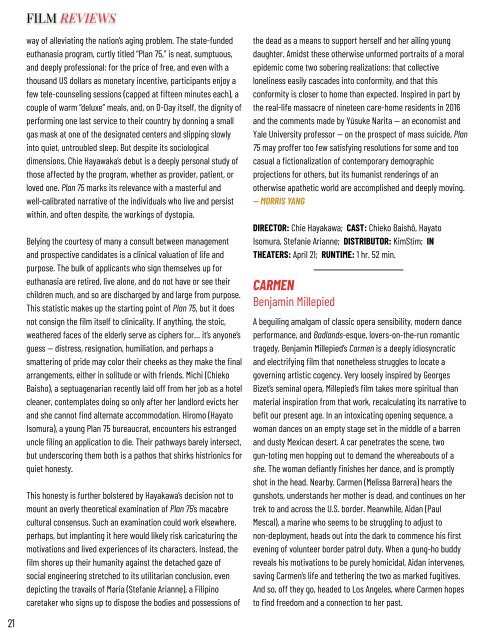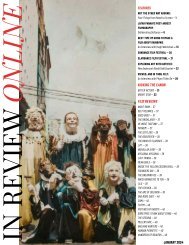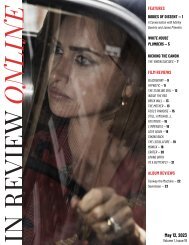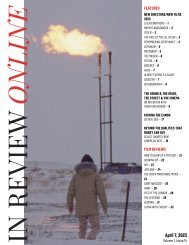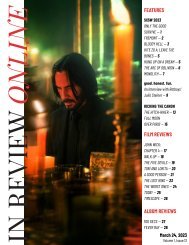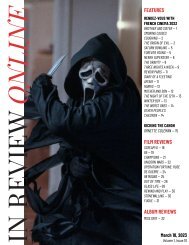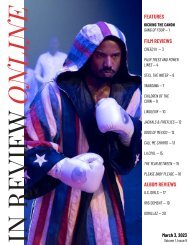InRO Weekly — Volume 1, Issue 16
You also want an ePaper? Increase the reach of your titles
YUMPU automatically turns print PDFs into web optimized ePapers that Google loves.
FILM REVIEWS<br />
way of alleviating the nation’s aging problem. The state-funded<br />
euthanasia program, curtly titled “Plan 75,” is neat, sumptuous,<br />
and deeply professional: for the price of free, and even with a<br />
thousand US dollars as monetary incentive, participants enjoy a<br />
few tele-counseling sessions (capped at fifteen minutes each), a<br />
couple of warm “deluxe” meals, and, on D-Day itself, the dignity of<br />
performing one last service to their country by donning a small<br />
gas mask at one of the designated centers and slipping slowly<br />
into quiet, untroubled sleep. But despite its sociological<br />
dimensions, Chie Hayawaka’s debut is a deeply personal study of<br />
those affected by the program, whether as provider, patient, or<br />
loved one. Plan 75 marks its relevance with a masterful and<br />
well-calibrated narrative of the individuals who live and persist<br />
within, and often despite, the workings of dystopia.<br />
Belying the courtesy of many a consult between management<br />
and prospective candidates is a clinical valuation of life and<br />
purpose. The bulk of applicants who sign themselves up for<br />
euthanasia are retired, live alone, and do not have or see their<br />
children much, and so are discharged by and large from purpose.<br />
This statistic makes up the starting point of Plan 75, but it does<br />
not consign the film itself to clinicality. If anything, the stoic,<br />
weathered faces of the elderly serve as ciphers for… it’s anyone’s<br />
guess <strong>—</strong> distress, resignation, humiliation, and perhaps a<br />
smattering of pride may color their cheeks as they make the final<br />
arrangements, either in solitude or with friends. Michi (Chieko<br />
Baisho), a septuagenarian recently laid off from her job as a hotel<br />
cleaner, contemplates doing so only after her landlord evicts her<br />
and she cannot find alternate accommodation. Hiromo (Hayato<br />
Isomura), a young Plan 75 bureaucrat, encounters his estranged<br />
uncle filing an application to die. Their pathways barely intersect,<br />
but underscoring them both is a pathos that shirks histrionics for<br />
quiet honesty.<br />
This honesty is further bolstered by Hayakawa’s decision not to<br />
mount an overly theoretical examination of Plan 75’s macabre<br />
cultural consensus. Such an examination could work elsewhere,<br />
perhaps, but implanting it here would likely risk caricaturing the<br />
motivations and lived experiences of its characters. Instead, the<br />
film shores up their humanity against the detached gaze of<br />
social engineering stretched to its utilitarian conclusion, even<br />
depicting the travails of Maria (Stefanie Arianne), a Filipino<br />
caretaker who signs up to dispose the bodies and possessions of<br />
the dead as a means to support herself and her ailing young<br />
daughter. Amidst these otherwise unformed portraits of a moral<br />
epidemic come two sobering realizations: that collective<br />
loneliness easily cascades into conformity, and that this<br />
conformity is closer to home than expected. Inspired in part by<br />
the real-life massacre of nineteen care-home residents in 20<strong>16</strong><br />
and the comments made by Yūsuke Narita <strong>—</strong> an economist and<br />
Yale University professor <strong>—</strong> on the prospect of mass suicide, Plan<br />
75 may proffer too few satisfying resolutions for some and too<br />
casual a fictionalization of contemporary demographic<br />
projections for others, but its humanist renderings of an<br />
otherwise apathetic world are accomplished and deeply moving.<br />
<strong>—</strong> MORRIS YANG<br />
DIRECTOR: Chie Hayakawa; CAST: Chieko Baishô, Hayato<br />
Isomura, Stefanie Arianne; DISTRIBUTOR: KimStim; IN<br />
THEATERS: April 21; RUNTIME: 1 hr. 52 min.<br />
CARMEN<br />
Benjamin Millepied<br />
A beguiling amalgam of classic opera sensibility, modern dance<br />
performance, and Badlands-esque, lovers-on-the-run romantic<br />
tragedy, Benjamin Millepied’s Carmen is a deeply idiosyncratic<br />
and electrifying film that nonetheless struggles to locate a<br />
governing artistic cogency. Very loosely inspired by Georges<br />
Bizet’s seminal opera, Millepied’s film takes more spiritual than<br />
material inspiration from that work, recalculating its narrative to<br />
befit our present age. In an intoxicating opening sequence, a<br />
woman dances on an empty stage set in the middle of a barren<br />
and dusty Mexican desert. A car penetrates the scene, two<br />
gun-toting men hopping out to demand the whereabouts of a<br />
she. The woman defiantly finishes her dance, and is promptly<br />
shot in the head. Nearby, Carmen (Melissa Barrera) hears the<br />
gunshots, understands her mother is dead, and continues on her<br />
trek to and across the U.S. border. Meanwhile, Aidan (Paul<br />
Mescal), a marine who seems to be struggling to adjust to<br />
non-deployment, heads out into the dark to commence his first<br />
evening of volunteer border patrol duty. When a gung-ho buddy<br />
reveals his motivations to be purely homicidal, Aidan intervenes,<br />
saving Carmen’s life and tethering the two as marked fugitives.<br />
And so, off they go, headed to Los Angeles, where Carmen hopes<br />
to find freedom and a connection to her past.<br />
21


